41+ Real-life Technology Graduate Job Interview Questions
Amina Ibrahim
In the fast-moving technology scene, landing your dream IT graduate job depends on how well you handle the interview process. From pre-interview jitters to facing a barrage of technology graduate job interview questions, you have to overcome and master these challenges to lock in the sought-after position.
But it is easier said than done. Technology interview questions can get edgier and they demand sharper preparation as compared to others. Of course, you have the basics down but for deeper queries, you need a trusty resource – like this guide.
What we prepared is a straightforward list of 42 genuine tech graduate job interview questions along with the most suitable answers. However, instead of trying to memorise these responses, use them as helpful pointers to get you ready for the interview. This way, you will be better equipped to respond naturally and showcase your true self during the interview.
42 most asked technology graduate job interview questions
We asked our IT graduates what questions they were asked during their interviews and they came back with these 42 questions. However, with the diverse roles in the public sector, it is difficult to pinpoint the specific questions you might face in your job interviews.
These examples just give you an idea about the types of questions that may be asked. Try to customise them to fit your potential employer's priorities as much as possible.
Personal
These questions are the icebreaker before the interviewer begins with the hard-core technology questions. But don't take these lightly as the answers will depict a lot about your personality and soft skills.
1. Tell us about yourself
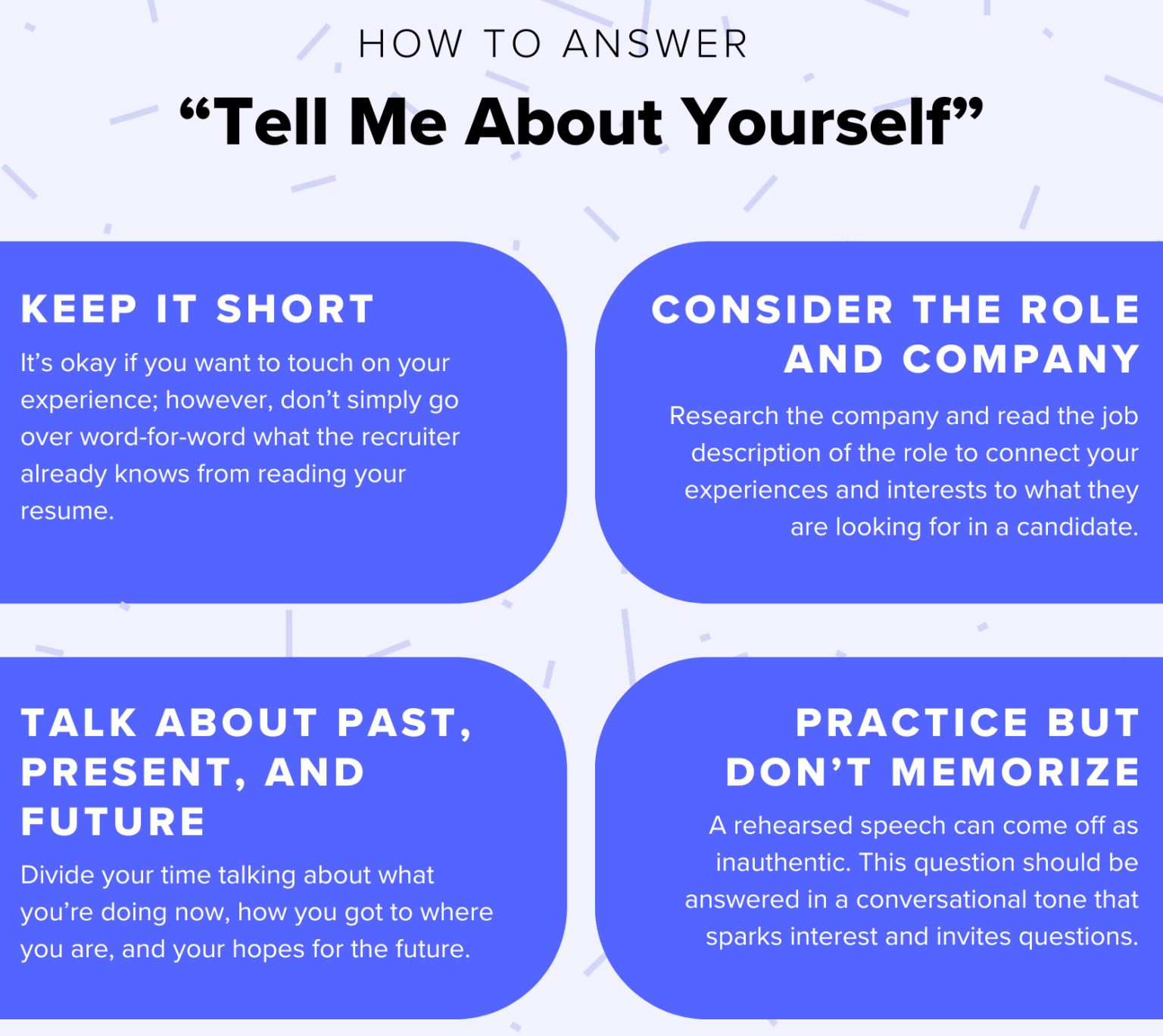
My name is Charlotte Jones. I hold a bachelor's degree in Computer Science from XYZ University. I have been passionate about technology since a young age and over the past few years, I polished my skills in software development.
I worked on various projects that involved coding, problem-solving, and teamwork. I enjoy exploring new programming languages and contributing to open-source projects.
What interviewers are looking for
Interviewers want to hear a concise summary of your professional background, education, and key skills, and how your passion for technology aligns with the position you are applying for.
2. What interests you about working for our company specifically?
I am particularly impressed with your company's commitment to innovation and its collaborative work culture. Your recent developments in AI and machine learning align perfectly with my interests and expertise.
Moreover, the opportunity to work with a team that values creativity and encourages employees to take on challenging projects is something I find incredibly appealing.
What interviewers are looking for
Interviewers want to see that you did your research on the company and they are looking for alignment between your aspirations and the company's values, projects, or advancements.
3. What are your strengths and weaknesses?
One of my strengths is my strong focus and analytical mindset. I enjoy analysing complex problems and finding efficient solutions. However, I noticed that at times, trying to be perfect makes me spend more time on the tasks than I need to.
To counter this, I have been actively working on time management skills and techniques to ensure I maintain a balance between precision and efficiency.
What interviewers are looking for
Interviewers want to assess your self-awareness of both your strengths and weaknesses.
4. Why should we hire you?
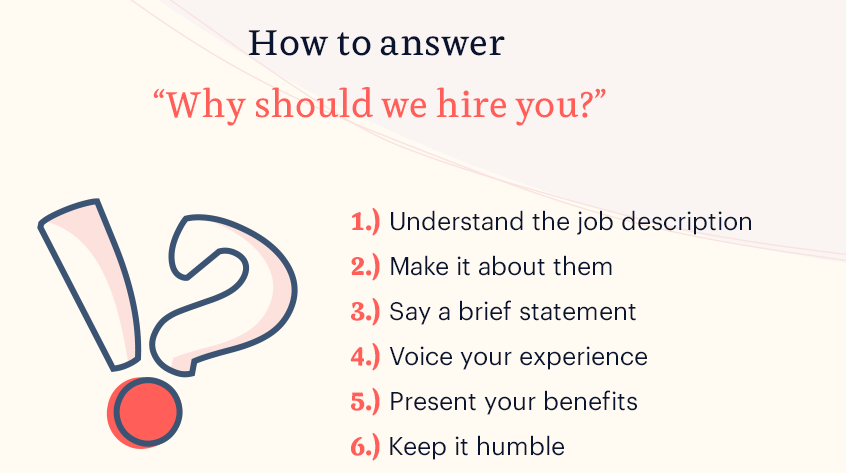
I believe my combination of technical skills, creativity, and a proven track record of delivering results makes me a strong fit for this role. My ability to adapt quickly to new technologies and my passion for problem-solving help me greatly in different projects. I am confident that I can bring fresh perspectives and innovative solutions to the team.
What interviewers are looking for
Interviewers want the reassurance that you possess the skills, experience, and qualities needed for the role. They want to know how hiring you will benefit the company and how your skills align with the job description.
5. What have you learned in your IT courses?
During my IT courses, I developed a strong foundation in programming languages like Java and Python. I also studied database management, network security, and software development methodologies.
Additionally, I developed strong problem-solving skills, learned to work together on team projects, and gained experience with various IT tools and technologies.
What interviewers are looking for
Interviewers are interested in understanding the technical knowledge and concepts you acquired during your degree.
6. If you could go back, would you study the same thing or something different?
Given that chance, I would absolutely choose the same field of studying IT. I always fancied the dynamic nature of technology and the constant evolution in this field. It is something where I can continuously learn and apply new skills.
The decision matches with my passion for innovation and problem-solving and I believe it is the perfect fit for my career goals.
What interviewers are looking for
Interviewers want to gauge your commitment to your chosen field and understand your thought process in pursuing this career path.
7. What are the past software projects that you worked on?
In my previous role as an intern at ABC Tech Solutions, I contributed to the development of a customer relationship management (CRM) system that streamlined client interactions and improved data management.
Another major project was a mobile application for tracking inventory. These experiences helped me apply my programming skills in real-world scenarios and collaborate effectively with cross-functional teams.
What interviewers are looking for
Interviewers want to know about your practical experiences in software development. This helps them assess your hands-on skills and how well they sync with the job requirements.
8. Who influenced your life the most and why?
That would be my high school computer science teacher, Mr Jonathan Williams. His passion for technology, engaging teaching style, and strong support sparked my interest. He taught me the technical aspects and also developed a sense of curiosity and love for continuous learning. His mentorship played a major role in helping me pursue a career in technology.
What interviewers are looking for
Interviewers are interested in knowing the factors and individuals that shaped your character and influenced your career path.
9. What books are you currently reading? What was the last book you read?
Currently, I am reading 'The Innovator's Dilemma' by Clayton Christensen which explores disruptive innovation strategies. Recently, I completed 'Code Craftsmanship' by Pete Goodliffe which discusses advanced software development techniques.
These readings help me think strategically and also refine my software skills for comprehensive problem-solving.
What interviewers are looking for
Interviewers want to know how committed you are to continuous learning and how your reading choices helped develop software development skills.
10. How many computers do you own?
I have 2 computers. A high-performance laptop is my mobile command centre for work, while a purpose-built desktop is equipped for heavy coding and a virtual environment.
What interviewers are looking for
They are trying to understand your technical setup for productivity and your preparedness for different tasks.
11. Do you enjoy playing with gadgets?
Absolutely, I do. Exploring and working with gadgets has been my hobby since a very early age I genuinely enjoy understanding how they work, troubleshooting issues, and keeping up with the latest technology trends.
What interviewers are looking for
The interviewers are evaluating your passion for technology and your ability to stay updated on new developments.
General technology
Now the questions will gradually start taking the technical turn. From here on, technical questions will build up.
12. Why did you choose to pursue a career in technology?
I was always fascinated by the way technology shapes our world. Growing up, I enjoyed playing with computers and gadgets. As I grew old, I realised the potential of technology to solve real-world problems.
Its constant evolution and impact on efficiency intrigued me. Pursuing a career in technology allows me to blend my passion for problem-solving with a dynamic and ever-changing field.
What interviewers are looking for
Interviewers want to understand your motivation and passion for technology and why you chose this field.
13. What area/part of technology excites you?
I am particularly excited about advancements in artificial intelligence and machine learning. The ability to teach machines to learn and adapt to new information has vast potential across various industries. It is fascinating to see how these technologies can solve complex problems and improve efficiency.
What interviewers are looking for
Interviewers want insight into your specific interests in technology and your genuine enthusiasm for emerging fields.
14. What is your approach to learning new technology?
I believe in a hands-on approach. When faced with a new technology, I start by understanding the fundamentals through documentation and online resources. Then, I focus on practical implementation and work on small projects to apply what I learned.
I find that this combination of theory and hands-on experience speeds up the learning process and helps me understand concepts more thoroughly.
What interviewers are looking for
Interviewers want to understand your practical learning methods and adaptability.
15. What do you know about the technology industry?
Technology is ever-evolving. There is software, hardware, and telecom. But what fascinates me is the constant innovation. Companies pushing boundaries, coming up with new solutions. Plus, there is a lot of teamwork. It is a big ecosystem where collaboration is key and staying on top of what is new is the new job requirement.
What interviewers are looking for
Interviewers are interested in your knowledge of the industry, its trends, and your awareness of the broader technological outlook.
16. What is the general trend in the telecommunications industry?
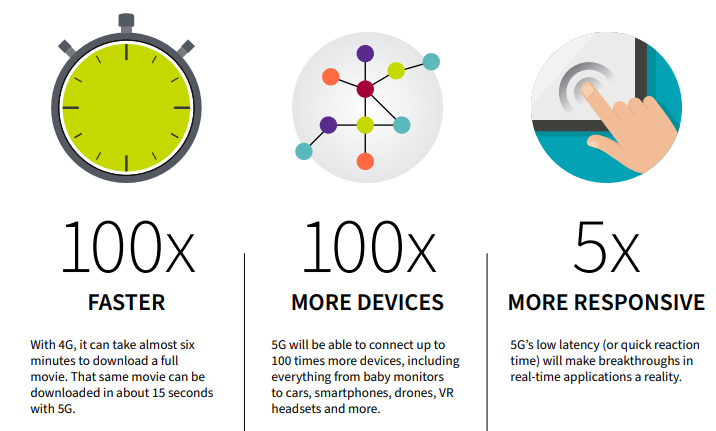
The general trend in the telecommunications industry is a relentless move towards greater connectivity, speed, and efficiency. The advent of 5G technology is a prime example. This shift is also enabling a more connected world through the Internet of Things (IoT).
The industry is also exploring virtualisation and software-defined networking to make networks more flexible and adaptable to changing demands. Also, there is an increased emphasis on security measures, given the growing volume of data being transmitted across networks.
What interviewers are looking for
Interviewers want to assess your awareness of industry trends and an understanding of the technological trajectory in telecommunications.
17. How do you see yourself involved in the use and progress of technology?
I see myself as an active contributor. Whether through developing innovative solutions or staying updated with emerging trends, my goal is to stay ahead. I believe in using technology to solve real-world problems and enhance user experiences.
As technology continues to advance, I plan to stay adaptable and continue contributing to the growth of the industry, whether through collaborative projects, research, or creating a culture of learning within any team I am a part of.
What interviewers are looking for
Interviewers want to assess your vision and ambition about your role in the ongoing progress of technology.
18. What do you like about coding?
Coding is my creative outlet and problem-solving tool. The thrill of turning concepts into functional software, the satisfaction of overcoming challenges, and the endless potential for innovation are what I love. It is a dynamic process that fits perfectly with my passion for building and creating.
What interviewers are looking for
Interviewers aim to understand your motivation for coding and your appreciation for its creative and problem-solving aspects.
19. What was the greatest invention 100 years ago?
The greatest invention from about a century ago, around the 1920s, would arguably be the television. It revolutionised how we consume information and entertainment by bringing audio and visual content right into people's homes. It provided a window to the world and also played a crucial role in shaping culture and societal norms.
What interviewers are looking for
Interviewers want to assess your historical perspective on technology and your understanding of the historical significance of inventions.
20. What is the best invention in the 21st century?
In the 21st century, it is tough to pinpoint a single "best" invention since there have been so many impactful ones. However, if I had to choose, I would say the smartphone has had a major influence on our lives. It transformed communication, information access, and even our daily routines.
What interviewers are looking for
Interviewers are interested in your perspective on recent technological advancements and your understanding of the societal implications of technological innovations.
21. How do you keep up to date with digital trends?
I make it a point to stay informed through different methods. I follow reputable tech news websites, blogs, and online forums to stay updated on the latest developments. I also actively participate in professional networks like LinkedIn, where discussions and shared content help me understand industry trends.
Attending conferences, webinars, and workshops also allows me to interact with experts and learn about emerging technologies firsthand.
What interviewers are looking for
Interviewers are assessing your commitment to staying updated on digital trends and how you use different channels for learning and networking.
22. Where do you see the tech industry headed in the next few years?
Looking ahead, the tech industry is set for some exciting developments. We will likely witness further advancements in artificial intelligence and machine learning, with applications ranging from improved automation to enhanced data analysis.
Cloud computing will continue to expand. The IoT is expected to become more pervasive and connect an even larger number of devices and systems. Cybersecurity will remain a top priority. Also, the integration of 5G technology will open new possibilities in areas like augmented reality and smart cities.
What interviewers are looking for
Interviewers want insights into your vision for the industry's future and if you can identify key trends that will shape how things work.
23. What does the connected society mean to you?
For me, a connected society means the integration of technology into various aspects of our lives. It goes beyond just having devices linked to the internet. This interconnectedness can lead to smarter cities, more efficient businesses, and enhanced collaboration on a global scale.
It also brings challenges, particularly concerning privacy and security, but the overall vision is of a society where technology catalyses positive change.
What interviewers are looking for
Interviewers are interested in your understanding of broader technology concepts.
Technical
These are hard-core technical interview questions where hiring managers assess your technical concepts.
24. What is a router?
A router is a networking device that directs data traffic between computer networks. Its primary function is to analyse the destination addresses of data packets and determine the most efficient path for them to reach their intended destination. Routers operate at the network layer of the OSI model and are a major part of the functioning of the internet.
What interviewers are looking for
Interviewers are assessing your understanding of key networking concepts particularly the router's function, its role in managing data traffic, and optimising network performance.
25. What is SDN?
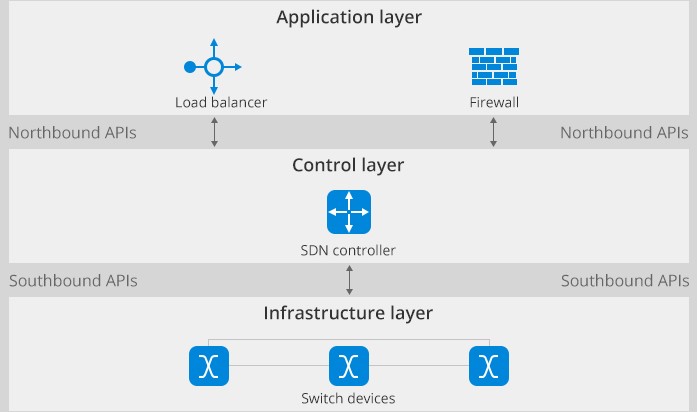
SDN, or Software-Defined Networking is a networking approach that makes them more flexible, programmable, and agile. In traditional networking, the control plane (deciding where data should go) and the data plane (actually sending the data) are tightly integrated within networking devices like routers and switches.
SDN decouples these planes and centralises control in software applications or controllers. This separation allows for more dynamic network management as administrators can programmatically adjust network behaviour to meet changing requirements without having to modify individual devices.
What interviewers are looking for
Interviewers want to gauge your familiarity with networking technologies and their role in centralising network management for enhanced flexibility and efficiency.
26. What is the Cloud?
The cloud is a network of servers that are accessed over the Internet to store and manage data, run applications, and deliver various services. Instead of relying on a local server or computer, you use the power of remote servers that a cloud service provider maintains. It allows you to access files and applications from anywhere with an internet connection.
What interviewers are looking for
Interviewers want to assess your knowledge of cloud computing concepts and the role they play in today’s era.
27. Do you know what IoT is? Can you give an example?
IoT is the network of interconnected devices that communicate and share data with each other through the internet. These devices can range from everyday objects like household appliances and wearable devices to industrial machinery.
An example would be a smart thermostat that can adjust the temperature based on your preferences and usage patterns. It connects to the internet to receive updates and can be controlled remotely through a smartphone app.
What interviewers are looking for
Interviewers are looking at how updated you are with the concept of IoT and its application in our everyday lives.
28. Describe what a database is
A database is a structured collection of data that is organised in a way that allows for efficient storage, retrieval, and management. It acts as a central repository where information can be systematically stored in tables, each containing rows and columns. Databases provide a means to organise and structure data logically and make it easier to query and analyse.
What interviewers are looking for
Interviewers assess how you demonstrate knowledge of a database's purpose, structure, and role in organised data management.
29. How can someone make money using Facebook?
One common method is through social media marketing where businesses promote their products or services to a targeted audience on the platform. This can be through running paid advertising campaigns or creating engaging content to attract customers.
Additionally, you can monetise your Facebook presence with sponsored posts, affiliate marketing, or by creating and selling products directly on the platform. Facebook also offers features like Facebook Marketplace where you can buy and sell goods locally.
What interviewers are looking for
Interviewers want to evaluate your awareness of social media monetisation strategies and your understanding of how businesses can use them to make money.
30. What is network society?
A network society refers to a societal structure where communication, information, and social interactions are heavily influenced by digital networks, particularly the Internet. It is characterised by the widespread connectivity among individuals, organisations, and devices.
In a network society, people can easily share information, collaborate, and form communities online. This shows the impact of digital technology on various aspects of our lives, including communication, business, education, and social relationships.
What interviewers are looking for
Interviewers are trying to analyse how well you understand the technology's impact on society and the role of digital networks in shaping various aspects of human interaction.
31. What is polymorphism?
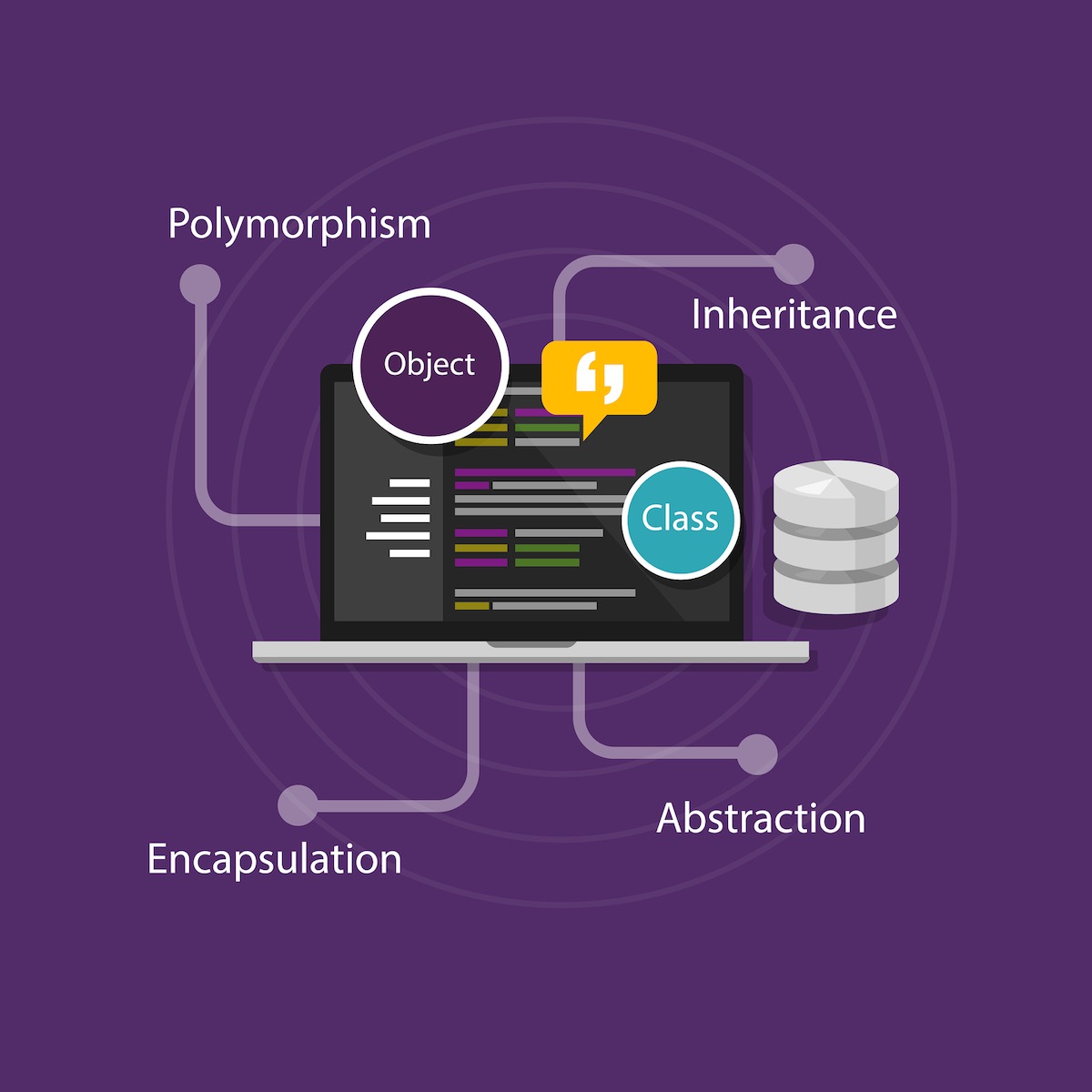
Polymorphism is a concept in object-oriented programming that allows objects of different types to be treated as objects of a common type. You can use different classes interchangeably through a common interface or method signature.
This helps create more modular and extensible code as new classes can be added without modifying existing code that relies on the common interface.
What interviewers are looking for
Interviewers are looking to evaluate your knowledge of programming concepts especially polymorphism's role in enhancing code flexibility, reusability, and scalability.
32. What is a deadlock?
A deadlock is a state in concurrent computing where 2 or more processes are unable to proceed because each is waiting for the other to release a resource. It is a scenario that can stall the entire system.
Deadlocks are typically associated with concurrent or multi-threaded systems where multiple processes are competing for shared resources like memory or files. To resolve a deadlock, one or more processes should be interrupted or resources need to be forcibly released
What interviewers are looking for
Interviewers want to assess your understanding of critical concepts in concurrent computing.
33. What is the difference between class and object?
In object-oriented programming, a class is a template that defines the attributes and behaviours common to a group of objects. It serves as a blueprint for creating objects. An object, on the other hand, is an instance of a class. It is a concrete realisation of the class and represents a specific entity with its own set of data and behaviour.
What interviewers are looking for
Interviewers want to evaluate your grasp of fundamental object-oriented programming concepts.
34. Explain the Software Development Life Cycle
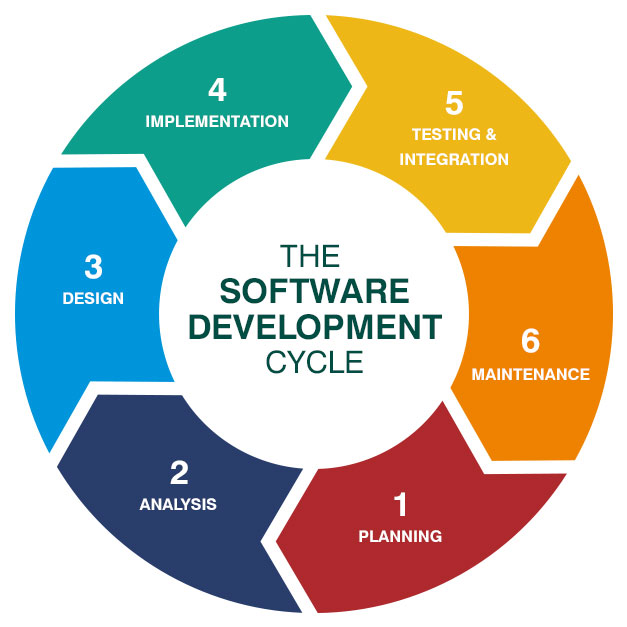
The Software Development Life Cycle (SDLC) is a systematic process or framework that guides the development of software applications from conception to deployment and maintenance. It involves several stages, including:
- Requirements gathering
- System design
- Implementation (coding)
- Testing
- Deployment
- Maintenance
Each stage has its own set of activities and deliverables and the process is iterative. The SDLC ensures that software is developed in a structured and organised manner and meets user requirements and quality standards.
What interviewers are looking for
Interviewers are looking to assess your understanding of software development processes and see if you are familiar with the sequential phases involved in them.
35. Tell me about the specific developments in the country's NBN program
In recent NBN developments, the country focused on expanding high-speed broadband infrastructure and introducing fiber-to-the-home connections for improved internet access. Initiatives include increased coverage, faster speeds, and technology upgrades – all aligning with the national goal of providing reliable and high-quality internet services to all citizens.
What interviewers are looking for
Interviewers want to evaluate your awareness of current technological developments, especially those related to national infrastructure projects.
36. Have you had any experience working with agile development methodologies?
Absolutely, I have had significant experience with agile development methodologies. During my internship, I worked on projects where we followed Scrum and Kanban frameworks. One of the key aspects I appreciate about agile is its emphasis on collaboration and adaptability.
Daily stand-ups, sprint planning, and retrospectives have been integral parts of my routine. I found that agile helps provide quicker responses to changing requirements and promotes a more iterative and customer-focused approach to development.
What interviewers are looking for
Interviewers want to assess your level of familiarity with agile methodologies and see if you could use them in their organisation.
37. How do you approach testing and quality assurance in software development?
My approach involves a combination of automated and manual testing. Automated tests help ensure that basic functionalities are not compromised with each code change. However, I also believe in the importance of manual testing to catch issues that automated scripts might overlook.
Continuous integration and continuous deployment (CI/CD) pipelines are essential components of my testing strategy. They provide quick feedback loops and help in the early detection of defects.
What interviewers are looking for
They want to know your understanding of the software development life cycle and your approach to ensuring the quality of the final product.
Hypotheticals
Hypothetical questions in an IT interview are a way of understanding your problem-solving capabilities and approach to various scenarios. Let’s take a look at the most common ones.
38. If you were in a relay race, would you run as the first, middle, or final runner? Why?
I would prefer running as the middle runner. In a relay race, the middle position requires a balance of speed and reliability. The first runner needs to make a strong start and the final runner needs to bring it home, but the middle runners maintain the momentum.
They have the responsibility of both receiving the baton and passing it on. I am someone who can adapt well to ongoing processes and ensure a smooth transition from one phase to another.
What interviewers are looking for
Interviewers are assessing your leadership skills, strengths and weaknesses, and your awareness of the needs of the team.
39. If you were given $1,000,000 now, what would you do with it?
Firstly, I would allocate a portion for personal financial goals, like savings and investments. Then, I would set aside some funds for further education or skill development to stay on top of the evolving tech landscape.
The remainder would be invested in a tech startup or used to develop a personal project. I believe in using resources to create value whether it is through supporting innovative ideas or contributing to the tech community.
What interviewers are looking for
Interviewers want to understand your values, whether you are inclined towards saving or investing, and how you handle windfalls or unexpected resources.
40. If you were given enough budget to create a tech application, what would it be?
Given the opportunity, I would love to create a comprehensive educational platform that focuses on personalised learning experiences. It would incorporate AI and machine learning to understand individual learning styles and adapt content accordingly.
The platform would cover a wide range of subjects and provide accessible education to people globally. It will promote critical thinking and problem-solving skills and make education more engaging and effective for users of all ages.
What interviewers are looking for
Interviewers want to see if you can think innovatively, justify your choices, and articulate a clear vision for the potential impact of the application.
41. Imagine you are grabbing a coffee with someone in a professional setting and both of you genuinely want to get to know each other. How would the conversation go?
I would start with some light topics like asking about their weekend plans or if they watched any good movies lately. I would share a bit about what I have been up to outside of work – maybe a recent trip or a new hobby I am learning.
From there, I would naturally steer the conversation towards work-related topics, maybe discussing some interesting projects they have been involved in or any tech trends that caught their eye.
What interviewers are looking for
Interviewers are assessing your communication skills and networking abilities and how well you can connect with colleagues and clients.
42. Do you have any questions for us?
Yes, I have a few questions. Firstly, could you tell me more about the team dynamics and how collaboration typically works here? Also, I am curious about the company's approach to professional development. Are there opportunities for training or attending conferences? And one more thing, what is the tech stack you are currently using?
What interviewers are looking for
Interviewers want to see your interest in the company and your understanding of its work culture.
Conclusion
You can’t always predict the exact technology graduate job interview questions you will face but what matters most is being adaptable and open to learning. Connect with mentors and IT professionals, get guidance, and prepare well.
Even if you come across a tricky question, how you handle it and remain composed under pressure can show what you are made of. Acknowledge areas where you may not have expertise – just show that you are eager to learn essential skills and improve.
Prosple is a leading online platform that connects recent and soon-to-be technology graduates with potential employers in the Australian job market. You can find thousands of graduate opportunities across locations using filters like industry, salary, location, work rights and job type.
With its easy-to-use interface, you can easily apply for jobs directly through the platform and track the status of your applications. Sign up for Prosple today and take the first step toward your dream technology graduate program.